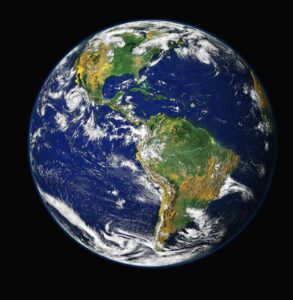
It was love that brought me to this jail cell. – Sandra Steingraber
When my granddaughter Nikayla was ten years old, climate change became real to her. She learned that glaciers and ice sheets are melting, endangering the habitats of Polar bears and Emperor penguins. She loves animals, as most children do, so she created a poster with pictures of hearts, the earth, and animals. The poster said:
“Save our earth! We all know our earth is at stake! We need to do something about it. Try not killing animals or grow a garden. We need our earth to live on. We need you to help save our earth. There are many endangered species of animals. Please save our animals. There is a Polar bear for instance and all of a sudden the ice melts under his feet and he sinks in. There is no land for thousands of miles so there is nothing to do. He just dies. We need to save our animals, too. Save our earth. Save our animals.”
My granddaughter empathized with the penguins and Polar bears, felt grief when she thought about their suffering, and responded by making a poster. Her feelings motivated her to action. Her response brings to mind John Wesley’s counsel to reflect on the suffering of animals as a way to “soften and enlarge our hearts.” The resulting empathy involves an experiential change: a change of attitude and an increase of love.
Studies show that in order for people to be motivated to take action on climate change, their knowledge and concern must move from the head to the heart. Those of us whose lives are still intact may not realize the grave implications of a warming world. Even if we understand climate change intellectually and accept the conclusions of climate scientists, we may not internalize the dangers if we experience relative stability in our day-to-day lives. This disconnection between our head and our heart may prevent us from responding in a way that is proportional to the dangers we face.
We have seen that scripture, tradition, and reason uphold the call for justice, but how can we internalize this knowledge so that it is confirmed at the level of our own experience? What will lift us out of denial, self-centeredness, despair, and paralysis, and motivate us to respond to the suffering of others by joining in the work for climate justice?
The answer is love. According to Michael Lodahl, “For Wesley the love of God is to be experienced, in some sense felt, deep within our beings. Wesley was not content with a purely intellectual faith, nor even with a simply volitional faith, but with a faith of conscious and experienced relation to God and neighbor.”
Wesley spoke of salvation as “deliverance from a blind, unfeeling heart, quite insensible of God and the things of God.” Religious faith is not simply a rational assent to a belief or doctrine, but as Wesley said, it is “no other than love, the love of God and of all mankind; the loving God with all our heart, and soul, and strength, as having first loved us…, as the fountain of all the good we have received, and of all we ever hope to enjoy; and the loving every soul which God hath made, every man on earth as our own soul. This love is the great medicine of life; the never failing remedy for all the evils of a disordered world; for all the miseries and vices of men.”
This love is real in human experience. We have explored the experience of God as revealed through creation and the experience of assurance of God’s forgiveness and love. Now we focus on the experience of God’s love within us, moving us to compassion for others. Compassion motivates us to acts of mercy and justice that witness to God’s love, embody hope, and positively influence the world. Love is the only foundation strong enough to carry us through the difficulties posed by climate change with courage, compassion, persistence, and hope.
Love is the only foundation strong enough to carry us through the difficulties posed by climate change with courage, compassion, persistence, and hope.
Some people may fear being swallowed up by pain, guilt, or the inability to cope if they open their hearts to the magnitude of suffering caused by climate change. Denial and suppression of such feelings may seem to be the only way to carry on with current responsibilities as a functional human being. But as we grow spiritually and mature in faith, our capacity for both joy and sorrow expand. As we become more fully alive and connected with others, we come to recognize the presence of love in the full range of human emotion. We move out of denial through faith and are carried by love. The climate crisis presents us with opportunities to demonstrate that love in a variety of ways, in solidarity with people on the front lines of the struggle for climate justice. As Joan Baez said, “Action is the antidote to despair….”
As people of faith, the climate crisis demands that each of us decide where we stand and what love requires. In each moment we have a choice: to follow where love leads or to relinquish our responsibility to choose. Each prayer and each action has significance. With each decision we move the world closer to climate chaos or to climate justice. In each moment we stand on the front lines of climate change.
Love brought Sandra Steingraber to a jail cell for civil disobedience. Love brought Jesus to the cross. Where will love bring you?
Sharon Delgado creatively adapts John Wesley’s theological method by using scripture, tradition, reason, and experience to explore the themes of creation and justice in her book Love in a Time of Climate Change, from which this article is excerpted with permission from Fortress Press. The premise is that love of God and neighbor requires us to honor creation and establish justice for our human family, future generations, and all creation. From the Introduction: “As we entrust our lives to God, we are enabled to join with others in the movement for climate justice and to carry a unified message of healing, love, and solidarity as we live into God’s future, offering hope amidst the climate crisis that ‘another world is possible.’ God is ever present, always with us. Love never ends.”


